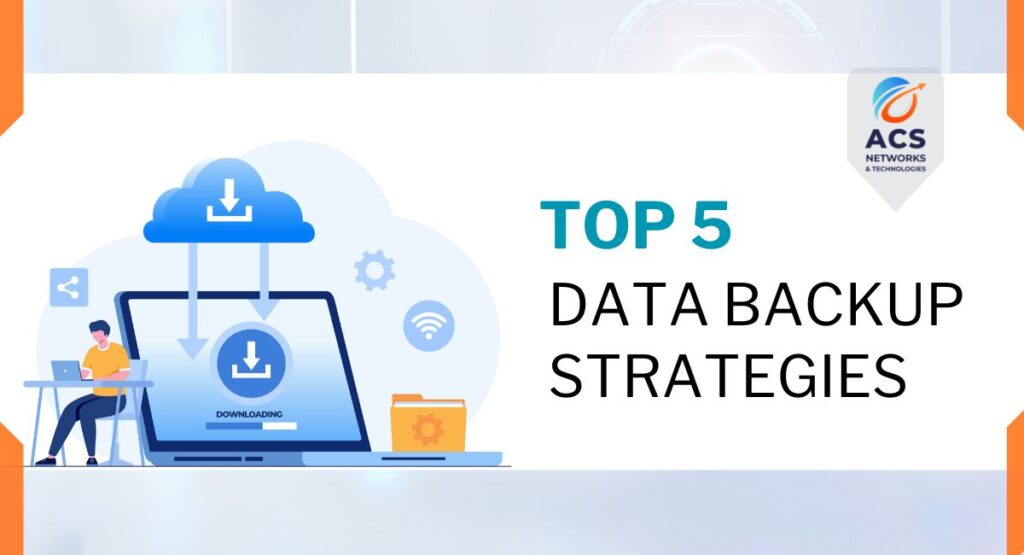
Imagine this: one Monday morning, a master server goes down—it can happen to anyone. A team employee’s laptop goes missing during the commute. Worse, a ransomware assault destroys data, putting the company to a halt. Consider this: your data is recovered in minutes, and your organization is back up and running—no concern, no losses. That reassurance? That’s the magic of data backup strategies executed properly.
At ACS Networks and Technologies Pvt Ltd, we know how important it is to protect your business continuity—so here are the Top 5 Data Backup plan Every Company Should Know.
1. Adhere to the 3‑2‑1 Rule (and Beyond): The Root of Best Practices
The 3‑2‑1 rule—have three copies of your data, two types of media on which to store them, and one copy off‑site—is among the most solid and practical data backup methodologies. In contemporary configurations, a cloud backup can be used as a second type of media if it is considered immutable.
For added dependability, most companies today implement the 3‑2‑1‑1‑0 rule, which includes an offline backup and a target of zero failures—providing excellent resilience even for ransomware
This plan isn’t merely a suggestion—it’s the cornerstone of any solid backup strategy, preventing single points of failure and keeping you ready for physical catastrophes, cyber attacks, or hardware failure.
2. Boost Backup Frequency with Smarter Technologies
Daily backups are just not adequate. Evolving dangers and commercial expectations necessitate quicker and more frequent backups. Backup technologies such as block-level incremental (BLI) backups may capture changes in close to real-time, lowering backup time and storage requirements.
Combining BLI with in-place or streaming recovery speeds up system recovery, ensuring uptime and meeting SLAs.
As part of the discussion about the best data backup practices, blending high-frequency incremental backups with fast-recovery choices is among the most suitable solutions for today’s business climate.
3. Leverage Cloud and Local Storage—Cloud Backup vs Local Backup
In cloud backup vs local backup, each has its advantages—and often the best approach is to use both:
- Local backups offer quick access, complete control, and eliminates reliance on internet or vendor up-time.
- Cloud backups provide off‑site redundancy, durability, and are well-suited for disaster recovery; they also enable sophisticated services such as DRaaS.
But watch out: cloud storage over time can be costly, and most providers levy egress charges—charges you’ll pay on recovery.
A hybrid backup strategy—with newer data readily accessible locally and older backups tiered to the cloud—is usually the most cost-effective and robust strategy.
Blending cloud backup vs local backup thoughtfully enables businesses to take advantage of high-speed recoveries and regional redundancy while keeping costs in check.
4. Automate Disaster Recovery and Runbooks
The truth is, complete disaster recoveries are infrequent—but when they do occur, they’re complicated. Servers have dependencies, applications need to restart in a particular order, and time is of the essence. Hand restoration under stress can lead to delays and mistakes.
That’s where automated disaster recovery runbooks enter the picture—documented, reproducible processes that can be initiated with a click to reboot systems in the correct order.
Such automation is one of the best data backup methods to guarantee reliability and minimize downtime, transforming a several-hour manual recovery into minutes of choreographed recovery.
5. Secure and Validate: Don’t Forget Testing, Data Encryption, and Endpoint/SaaS Protection
Your backups are no better than they stay secure, viable, and intact. Strong strategy meets multiple security aspects:
- Encryption and access: Limit access to the backups, implement strong encryption—even at the hardware level for removable media—and utilize MFA and logical isolation.
- Safe places: Keep backups in fireproof, isolated places—and off-site copies beyond the reach of natural disasters or physical loss.
- Backup verification and testing: Periodically test file and system recovery to verify backups are whole and effective.
- Endpoint and SaaS protection: Laptop, mobile, and cloud app data (such as Office 365, Google Workspace) aren’t inherently backed up by default—assert control with specialized backup of endpoints and SaaS platforms.
Combined, these steps fortify security, compliance, and confidence in your backup operations.
Secure Your Information with ACS Networks & Technologies Pvt Ltd
At ACS Networks & Technologies Pvt Ltd, we transform tried and tested data backup methods into actual, in-the-field protection. From cloud and hybrid backups to automated disaster recovery and endpoint protection, our solutions are built to protect your mission-critical data.
Being a GACS-certified company, we provide robust, scalable, and compliant backup solutions—so your business remains safe, no matter what. Choose us to ensure continuity, security, and peace of mind.


